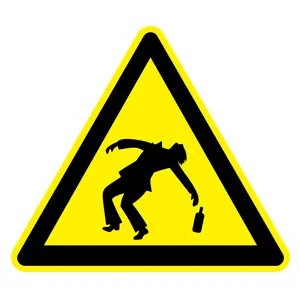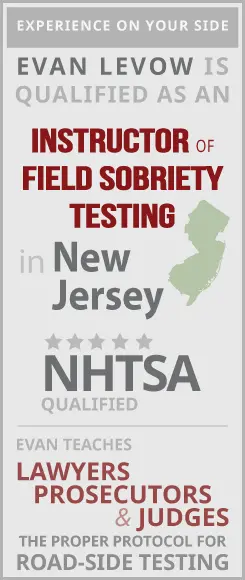Police officers use a variety of techniques to help determine the likelihood of intoxication in drivers suspected of being under the influence, including breath tests, blood tests, urine tests, and field sobriety tests.
In this post, we discuss three types of field sobriety tests that can be used by officers in New Jersey.
3 Types of Field Sobriety Tests
There are three types of field sobriety tests which have been developed and standardized by the National Highway Traffic Safety Administration (NHTSA), in an effort to help officers better identify intoxicated drivers.
However, it is important to note that if you are pulled over for suspicion of drunk driving in the State of New Jersey you are not required by law to submit to any of these tests.
Furthermore, field sobriety tests are not able to predict intoxication with 100% accuracy.
Therefore, it is possible to challenge the accuracy and reliability of these tests in court if you are arrested for DWI and submitted to field sobriety testing.
Horizontal Gaze Nystagmus (HGN) Test
Horizontal Gaze Nystagmus is an involuntary jerking movement of the eye that occurs when the eye moves side to side. Medical literature has established that there are 40 causes of nystagmus, one of which is alcohol intoxication.
As a result, this test is not admissible in New Jersey courts as evidence of intoxication. Some courts will allow HGN evidence in to determine whether there was probable cause for the arrest.
This makes no sense, since testimony regarding the meaning of the results of HGN testing is not admissible.
When administering the HGN test, an officer will use a finger or pen placed 12 to 15 inches away from the driver’s face and move it slowly from side to side.
The officer is looking for three specific indicators in the driver’s eyes which could signal that he or she may be intoxicated:
- Difficulty in following the object smoothly with the eyes
- Jerking in the eyes when fully extended to the side
- If jerking in the eyes occurs within 45 degrees from center
One very common cause of nystagmus is flashing lights. This is called optokinetic nystagmus.
Walk-and-Turn (WAT) Test
The Walk-and-Turn test is another type of field sobriety test that officers use in their efforts to determine intoxication.
When administering this test, an officer asks a driver to take nine steps along a straight line by placing the heel of the leading foot against the toe of the trailing foot during each step. After completing the ninth step, the driver must turn on one foot and repeat the same process on the way back.
If a driver has two or more of the following eight cues, the officer has reached a “decision point” and may arguably arrest the unbalanced driver:
- The driver cannot keep his or her balance
- The driver begins walking before all of the instructions are given
- The driver stops walking to regain balance
- The driver does not walk heel-to-toe
- The driver steps off of the straight line
- The driver uses arms to balance
- The driver makes an improper turn
- The driver takes more or less than nine steps
One-Leg Stand (OLS) Test
The One-Leg Stand test is another type of field sobriety test that police officers administer when attempting to identify intoxicated drivers.
In the One-Leg Stand test, the driver is asked to stand on one foot with the other foot raised approximately six inches off of the ground and count aloud in thousands.
For example, the driver would count, “one-thousand-one, one-thousand-two, one-thousand-three…” until told to stop. The driver must keep arms down to the side, and cannot raise them more than six inches from the side of the body.
The officer times the driver for thirty seconds and looks for two out of four specific indications of intoxication:
- The driver sways while balancing
- The driver uses his or her arms to maintain balance
- The driver hops in order to maintain balance
- The driver puts his or her foot down before the end of the test
Do I Have To Submit To A Field Sobriety Test?
Many people believe that they must submit to a field sobriety test if a police officer asks them to.
However, the law does not require that you submit to a field sobriety test and you cannot be penalized for refusing to submit to a field sobriety test.
That said, officers are not required to tell you that these tests are voluntary, so it is important to remember your rights with regard to roadside tests.
Additionally, the accuracy of these road-side exercises may be challenged in court by an experienced DWI defense attorney trained in the testing.
Levow DWI Law, P.C.: Representing The Rights of Drivers in New Jersey
At Levow DWI Law, P.C., we are dedicated to defending the rights of individuals who have been arrested for DWI in New Jersey.
If you or a friend have been arrested for DWI, please contact us today for a free consultation. We will evaluate your case and help you determine the best course of action based on your specific situation.



